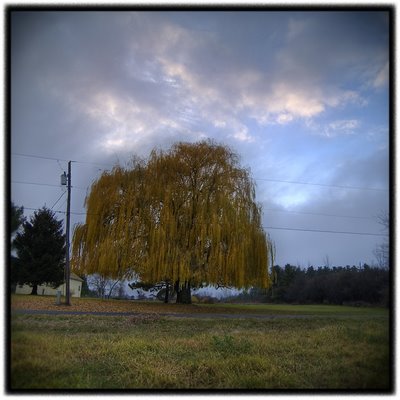Thursday
Nov162006
ku # 437 and something rarely talked about in polite photographic circles
 Thursday, November 16, 2006 at 08:07AM
Thursday, November 16, 2006 at 08:07AM 
Yesterday was unseasonably warm. The day started very sunny but by late morning a deep grey shrouded the sky. Around 4pm there was a brief and tiny window in the western sky. As f8-and-be-there serendipity would have it, I was driving by this magnificent willow at that tiny-window moment.
As I was key-stroking yesterday's "thought", a then ill-formed notion popped into my head about the connection between a person's photography and their, for lack of a better psycho-babble term, personality. We all know, as the conventional wisdom goes, that Art is a reflection of its creator - "inner" vision and voice and all that.
This notion has been rattling and clanging around in my noodle for quite some time. Not that I doubt the validity of the notion, it's more that I have been trying to figure out what my photography says about me. I think I gave myself a clue in yesterday's "thought" - specifically the idea that "...it (the weather) is what it is and I take as it comes..." and "...I ,,, photograph what I see when I see it...".
Bingo.
There is a connection between the f8-and-be-there serendipity of ku # 437 (and almost all of my ku photography) and a take-it-as-it-comes "attitude" (preternatural, not adopted) that has pervaded my life. Big or small, I can't seem to plan anything. Just ask my f8-and-be-there serendipity wife who gets somewhat exasperated with the vacant stare she gets from me every time she asks something as simple as what I have planned for the weekend.
Even though f8-and-be-there serendipity could be considered one of the defining characteristics of me, my photography and my life, it is certainly, for purposes of this discussion about photography, not the only thing that forms my photographic vision/voice, but that's a topic for another time.
However, this excerpt from an interview with Paul Caponigro - FOCUS magazine, Dec. 2006 - is instructive:
"I was looking for a very core place, a place that functioned despite all the information and influence. I studied Gurdjieff, looking for reinforcement of what I already knew. When you talk about mysticism and the spirit, you are on pretty shakey ground. Discussion about it and ways of achieving it can be as much a hinderence as a help. I was aware that something in me knew something. Of all the systems that I studied, Gurdjieff provided the most practical approach to reaching that personal knowledge. It had nothing to do with whether or not you were going to be a better artist. Nothing! It had to do with developing your inner place, and once developed, you could apply it; it would automatically come into everything you did. My photographs are no better than my inner space. Gurdjieff teaches you that you must constantly work on your inner space."
And this from the American artist and teacher Robert Henri:
"The man who wants to procuce art must have the emotional side first...art...(is) the measure of the man."
On a purely person note, this measure of the man and no better than my inner space stuff is why I seem to have no respect for the pretty-picture gang. Their work is just shallow, and, by extension, at least to some extent, so are the "artists" - not that I think that they are "bad" people, I just don't want my step daughter to marry one.
Maybe f8-and-be-there should be changed to know-youself-and-be-there.
FEATURED COMMENT: Paul Butzi wrote:"If you don't live it, it won't come out your horn"--Charlie Parker

Reader Comments (3)
I really resonate with what you are saying here. This is all stuff I've been grappling with for quite some time now. I totally agree that your inner space has so much to do with the stuff that comes out of your camera. That is what I"ve been struggling with so much. Not the photos, but myself, my personal growth. My inner world has become my first priority. All else will fall into place as long as I keep that in mind.
--Charlie Parker
And while we are sharing quotes, this I think is appropriate:
"There is only you and your camera. The limitations in your photography are in yourself, for what we see is what we are." Ernst Haas